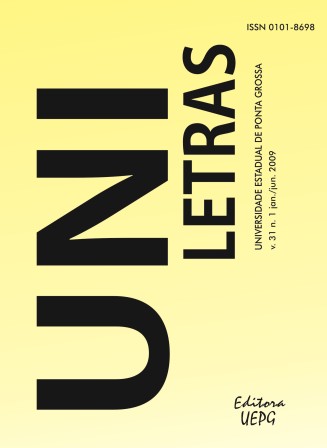A LINGUAGEM (PÓS) COLONIAL, EM THE SACRIFICIAL EGG, DE CHINUA ACHEBE (1962)- Doi: http://dx.doi.org/10.5212/Uniletras.v.31i1.033044
DOI:
https://doi.org/10.5212/uniletras.v31i1.675Abstract
Neste trabalho fomentaremos uma análise a partir de um estudo que abarca os pressupostos teóricos sobre pós-colonialismo e estudos culturais, como: multiculturalismo, resistência, hibridismo, ou seja, teorias que envolvem as culturas do “terceiro mundo” e, respectivamente seus estudiosos como Ashcroft, Griffiths e Tiffin . A análise se debruçará sobre o conto em Língua Inglesa The Sacrificial Egg, (1962) de Chinua Achebe. Autor de origem nigeriana que é reconhecida por suas narrativas nacionalistas e de resistência. Ateremos pelo discurso lingüístico ora ab-rogativo, quando o autor se distancia do inglês padrão, inserindo na narrativa vocábulos próprios da língua Ibo, criando uma lacuna metonímica. Ora um texto apropriativo, quando se utiliza da língua inglesa do colonizador para subvertê-lo. Para que a pesquisa possa cumprir sua proposta, os métodos de procedimento serão histórico e comparativo, enquanto o caráter será descritivo/analítico, pois, dessa forma, os fatos podem ser identificados, descritos, classificados, interpretados e, principalmente, analisados pelo pesquisador sem a interferência e manipulação do mesmo. Haverá a descrição das teorias propostas juntamente com a narrativa em questão.
Downloads
Downloads
Published
Issue
Section
License
Authors that publish in the journal agree with the following terms:
a) The authors keep the copyright and grant to the journal the rights of the first publication, with the work simultaneously being licensed under the Creative Commons Attribution License that allows the sharing of the work with the recognition both of the authorship and the initial publication in this journal.
b) This journal provides immediate public access to all of its content, following the principle that making scientific knowledge freely available to the public provides greater worldwide democratization of knowledge. For more information about this approach, visit Public Knowledge Project, a Project that developed this system to improve the academic and public quality of research, distributing OJS as well as other softwares to support the publication system to public/open access to academic sources. Names and e-mail addresses in this website will be used exclusively for this journal purposes, not being available for other ends.

This work is licensed under a Creative Commons Attribution 4.0 International License.





